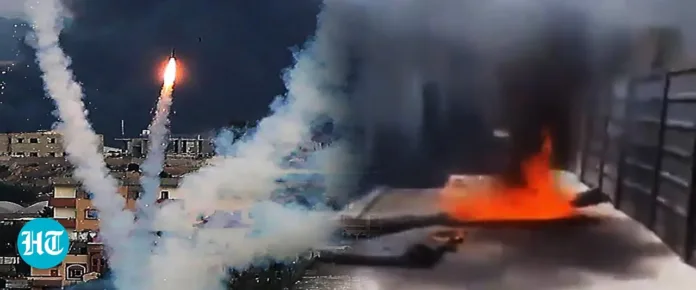Hezbollah escalates its rocket attacks with around 65 rockets fired at Northern Israel, causing fires but no reported injuries
On September 4, 2024, Hezbollah carried out its most significant rocket assault on Northern Israel since August 25, firing approximately 65 rockets, according to the Israel Defense Forces (IDF). The attack triggered around 48 rocket sirens in the affected regions, signalling a substantial increase in the level of threat compared to recent weeks.
The barrage resulted in multiple direct hits in the northern city of Kiryat Shmona and other areas, leading to fires in fields and causing notable damage. Despite the intensity of the attack, no injuries have been reported. The IDF initially struggled to clarify the exact number of rockets due to the rapid pace of the assault, which disrupted their air defence operations. The sudden surge in rocket fire appears to have overwhelmed their defences, resulting in some rockets getting through despite efforts to intercept them.
This escalation comes after a period of relative quiet, during which Hezbollah had scaled back its attacks significantly. Prior to August 25, Hezbollah had frequently launched large-scale rocket assaults, sometimes firing hundreds of rockets in a single day. On August 25, the IDF responded to an imminent massive rocket strike by preemptively destroying a significant portion of Hezbollah’s arsenal, estimated at around 1,000 rockets. Despite this, Hezbollah managed to launch between 250 and 350 rockets on that day, marking its largest assault of the current conflict.
Since then, Hezbollah’s attacks had diminished, with daily rocket threats often in the single digits. The latest attack marks a dramatic shift, signalling Hezbollah’s readiness to escalate its actions against Israel. This renewed aggression underscores Hezbollah’s capability to rebound quickly, maintaining a substantial portion of its pre-war arsenal. The IDF estimates that Hezbollah still possesses around 140,000 of its initial 150,000 rockets, despite Israeli efforts to reduce their stockpile.
In response to the latest assault, the IDF launched counterattacks targeting locations in southern Lebanon believed to be the sources of the rocket fire. The military’s countermeasures, while aimed at disrupting Hezbollah’s operations, have been somewhat restrained compared to previous responses, focusing on minimizing further escalation. The IDF confirmed that an additional rocket was fired at Shtula around 1:40 p.m., landing in an open field without causing injuries.
The ongoing conflict has intensified political debate within Israel. Prime Minister Benjamin Netanyahu faces criticism for his handling of the situation, with opposition figures like Benny Gantz demanding more decisive action. Gantz has pushed for an ultimatum to Hezbollah, advocating for a resolution that would allow the evacuation of northern residents to end and facilitate their return home before the start of the school year.
Netanyahu, however, has been cautious about setting a firm deadline, preferring to maintain pressure on Hezbollah while focusing on the broader conflict with Hamas in the South. This approach has drawn criticism from various quarters, with critics accusing Netanyahu of prolonging the uncertainty and suffering of northern residents for political and strategic reasons.
Analysis:
Political: The latest escalation by Hezbollah has injected fresh urgency into the political debate within Israel. Prime Minister Benjamin Netanyahu’s reluctance to impose a deadline on Hezbollah has become a contentious issue, as opposition leaders criticize him for failing to restore security in northern Israel. The ongoing conflict with Hezbollah has placed Netanyahu in a difficult position, balancing the need for military pressure with the political necessity of addressing the concerns of northern residents. This situation reflects the broader challenges of managing domestic security and political pressure in times of prolonged conflict.
Social: The rocket attacks have exacerbated the social impact of the conflict, particularly for residents in northern Israel who have been evacuated from their homes. The continued threat and the destruction caused by the rockets have intensified the hardships faced by these communities. The debate over the government’s response to the attacks highlights the social divide between those demanding immediate action and those concerned about the broader strategic implications. The prolonged insecurity has also impacted daily life and public morale, illustrating the deep social consequences of ongoing military confrontations.
Racial: Although the immediate focus of the conflict is on the rocket attacks and their impact on Israeli communities, the broader context involves complex racial and ethnic dynamics. The conflict between Hezbollah, a Lebanese militant group, and Israel is situated within a larger regional struggle that includes various racial and ethnic dimensions. However, the current escalation has not prominently featured racial issues but rather centres on geopolitical and security concerns.
Gender: Gender dynamics play a subtle role in the broader context of the conflict, particularly in terms of the impact on civilian populations. Women and children, who are often disproportionately affected by such conflicts, face significant challenges during periods of heightened violence. The evacuations and disruptions caused by the rocket attacks have likely had a more severe impact on women and families, underscoring the gendered dimensions of conflict and displacement.
Economic: The economic impact of the rocket attacks includes damage to property and infrastructure in northern Israel, as well as the costs associated with military responses and evacuations. The ongoing conflict strains resources and affects economic stability in the affected regions. The uncertainty and disruption caused by the attacks also have broader economic implications, potentially affecting business operations, tourism, and local economies. The government’s decisions regarding military and diplomatic strategies will play a crucial role in shaping the economic consequences of the conflict.
